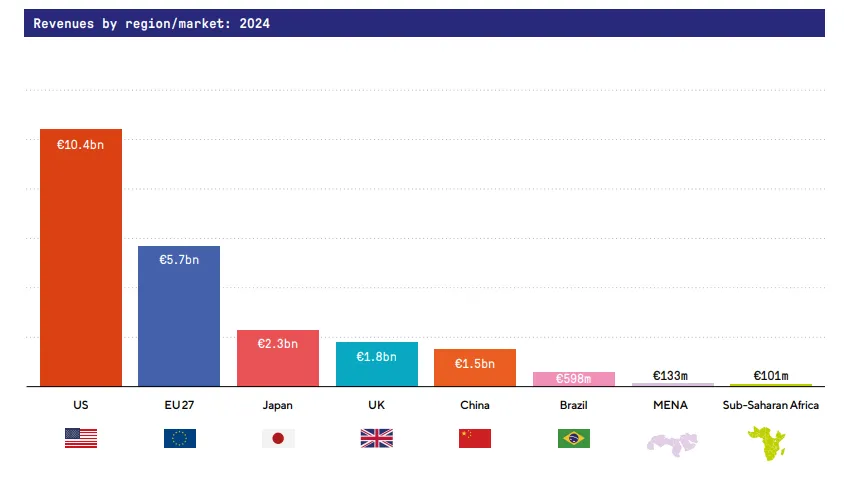
Japan and China’s Recording Industries Dwarf That of South Korea, Latest Data Reveals
Photo Credit: IFPI
Despite the endless coverage and hype surrounding the rise of K-pop, Japan and China still dwarf South Korea in terms of recording industry size.Unless you’ve been living under a rock for the past few years, you’re probably aware by now of the rise of South Korean pop music and culture as a global phenomenon.
What seemed to begin with the massive popularity of K-pop groups like BTS and Blackpink has turned into a veritable music institution thriving across the United States, Europe, and beyond. That’s been most recently apparent with the record-smashing success of Netflix’s animated film Kpop Demon Hunters.
But despite the seemingly endless coverage, hype, and attention put on the South Korean music industry and the explosion of K-pop worldwide, Japan and China still utterly dwarf the South Korean recording industry.
Of course, South Korea as a region is tiny compared to China, and it’s also just a fraction of Japan’s size. But why isn’t South Korea making a bigger impact, given all that we know about the continued global success of K-pop?
Asia’s Global Music Business is a ForceThe global music industry has been entering a new era led heavily by Asia. With over 3 billion people across China, Japan, India, South Korea, and Vietnam, Asia’s diverse markets are expanding rapidly and redefining the way music is created and distributed worldwide.
China, with its population of 1.4 billion, continues to lead Asia’s creative industry by sheer volume. According to data from consulting firm PwC, China’s creative industry is projected to grow by 7% annually. That’s driven by tech integration, streaming platforms like Tencent Music and NetEase Cloud Music, and government-backed cultural initiatives. In 2023, China’s government reported its cultural and creative industries saw 16% growth year-over-year, accounting for nearly 5% of its GDP.
Japan’s music market is the second-largest in the world, with 125 million people. The country is estimated to maintain steady growth of around 3.6% through 2028, driven by both physical and digital sales. Physical media like CDs remain strong in Japan, but the country’s true power lies in its live entertainment sector, estimated at $2.8 billion in 2024.
Tokyo continues to host major global tours and international collaborations; with opera houses, orchestras, and long-established labels working with digital innovators, Japan has positioned itself as a crossroads for Asia’s music scene.
South Korea’s Success is Carefully CultivatedSouth Korea is perhaps the most unique example of music redefining a nation’s global image. Despite its relatively small size compared to other Asian countries, it’s set an example that other regions have been quick to emulate.
In 2024, its digital music market was valued at $1.35 billion, with a projected compound annual growth rate (CAGR) of 6.15% through 2029—largely driven by K-pop’s global success. That’s led to a surge in its cultural exports, including music, film, and broadcasting, which clocked $13.6 billion last year. Music alone contributed $1.85 billion—a 51.5% increase from the previous year.
But if K-pop is the Wizard of Oz, the South Korean government is the man behind the curtain. A carefully constructed ecosystem of government support, entertainment conglomerates, and a global fan culture unparalleled in the rest of the world has driven South Korea’s music industry to new heights—even as the region itself continues to be dwarfed by the bigger fish in the pool.South Korea’s ability to combine music, fashion, drama, and lifestyle has created a one-and-done cultural export model that many other nations are striving to emulate.
Moreover, that model has helped artists in other parts of Asia (and other parts of the world) reach global audiences. Korean music competition shows have become a serious gateway for Japan’s top idol groups. Japan has been quick to adopt the proven K-pop cultivation model; the success of Japanese idol groups like JO1 and ME:I has continued to illustrate that, with both groups having appeared frequently on Korean music shows, even without officially debuting in Korea.
While the K-pop industry’s rapid growth streak hit a setback last year, industry experts attribute that to a combination of reduced aggressive marketing tactics and the lack of K-pop powerhouses like BTS and Blackpink.All five BTS members completed their mandatory military service by this summer, and the group is expected to make a big comeback next year. Blackpink has been touring as well, while several newer groups from JYP Entertainment, SM Entertainment, and Hybe have been making a splash to fill the void left by the lack of BTS.
Meanwhile, if the global success of Kpop Demon Hunters and its soundtrack have been any indication, K-pop is only going to get bigger. And if K-pop is succeeding, then South Korea is succeeding—whether it appears in the top recording industries worldwide or not.











